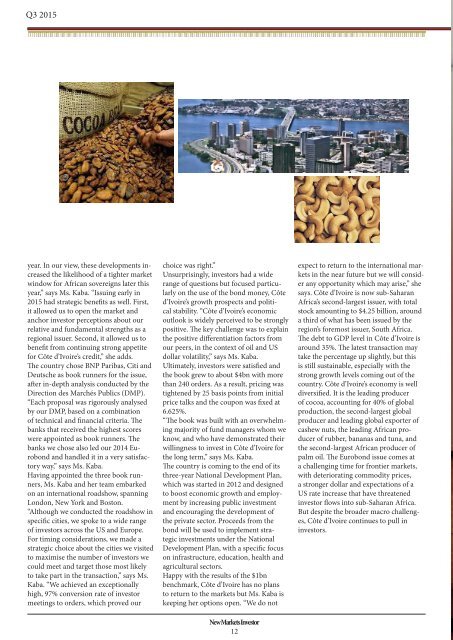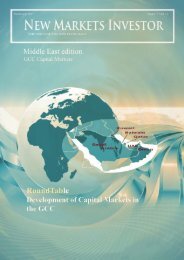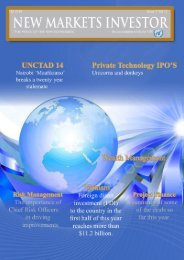New Markets Investor
Published by The Media Corporation
Published by The Media Corporation
You also want an ePaper? Increase the reach of your titles
YUMPU automatically turns print PDFs into web optimized ePapers that Google loves.
Q3 2015year. In our view, these developments increasedthe likelihood of a tighter marketwindow for African sovereigns later thisyear,” says Ms. Kaba. “Issuing early in2015 had strategic benefits as well. First,it allowed us to open the market andanchor investor perceptions about ourrelative and fundamental strengths as aregional issuer. Second, it allowed us tobenefit from continuing strong appetitefor Côte d’Ivoire’s credit,” she adds.The country chose BNP Paribas, Citi andDeutsche as book runners for the issue,after in-depth analysis conducted by theDirection des Marchés Publics (DMP).“Each proposal was rigorously analysedby our DMP, based on a combinationof technical and financial criteria. Thebanks that received the highest scoreswere appointed as book runners. Thebanks we chose also led our 2014 Eurobondand handled it in a very satisfactoryway,” says Ms. Kaba.Having appointed the three book runners,Ms. Kaba and her team embarkedon an international roadshow, spanningLondon, <strong>New</strong> York and Boston.“Although we conducted the roadshow inspecific cities, we spoke to a wide rangeof investors across the US and Europe.For timing considerations, we made astrategic choice about the cities we visitedto maximise the number of investors wecould meet and target those most likelyto take part in the transaction,” says Ms.Kaba. “We achieved an exceptionallyhigh, 97% conversion rate of investormeetings to orders, which proved ourchoice was right.”Unsurprisingly, investors had a widerange of questions but focused particularlyon the use of the bond money, Côted’Ivoire’s growth prospects and politicalstability. “Côte d’Ivoire’s economicoutlook is widely perceived to be stronglypositive. The key challenge was to explainthe positive differentiation factors fromour peers, in the context of oil and USdollar volatility,” says Ms. Kaba.Ultimately, investors were satisfied andthe book grew to about $4bn with morethan 240 orders. As a result, pricing wastightened by 25 basis points from initialprice talks and the coupon was fixed at6.625%.“The book was built with an overwhelmingmajority of fund managers whom weknow, and who have demonstrated theirwillingness to invest in Côte d’Ivoire forthe long term,” says Ms. Kaba.The country is coming to the end of itsthree-year National Development Plan,which was started in 2012 and designedto boost economic growth and employmentby increasing public investmentand encouraging the development ofthe private sector. Proceeds from thebond will be used to implement strategicinvestments under the NationalDevelopment Plan, with a specific focuson infrastructure, education, health andagricultural sectors.Happy with the results of the $1bnbenchmark, Côte d’Ivoire has no plansto return to the markets but Ms. Kaba iskeeping her options open. “We do not<strong>New</strong> <strong>Markets</strong> <strong>Investor</strong>12expect to return to the international marketsin the near future but we will considerany opportunity which may arise,” shesays. Côte d’Ivoire is now sub-SaharanAfrica’s second-largest issuer, with totalstock amounting to $4.25 billion, arounda third of what has been issued by theregion’s foremost issuer, South Africa.The debt to GDP level in Côte d’Ivoire isaround 35%. The latest transaction maytake the percentage up slightly, but thisis still sustainable, especially with thestrong growth levels coming out of thecountry. Côte d’Ivoire’s economy is welldiversified. It is the leading producerof cocoa, accounting for 40% of globalproduction, the second-largest globalproducer and leading global exporter ofcashew nuts, the leading African producerof rubber, bananas and tuna, andthe second-largest African producer ofpalm oil. The Eurobond issue comes ata challenging time for frontier markets,with deteriorating commodity prices,a stronger dollar and expectations of aUS rate increase that have threatenedinvestor flows into sub-Saharan Africa.But despite the broader macro challenges,Côte d’Ivoire continues to pull ininvestors.









